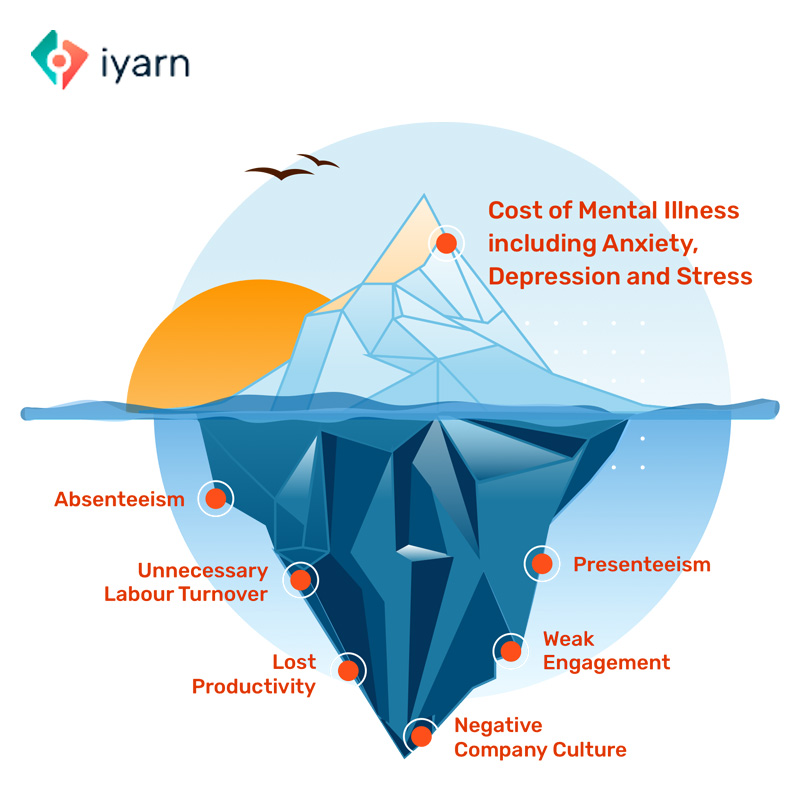The Iceberg of Mental Heath and Wellbeing: Challenges for Modern Workplaces
Mental health and wellbeing is vitally important to the modern workplace. In this feature, we’re taking a look at a range of mental health and wellbeing issues across the United Kingdom.
The Iceberg of Mental Health and Wellbeing
There are strong analogies between an iceberg and the issues surrounding mental health and wellbeing in the workplace. While some issues are highly visible, others are hidden below the waterline.

The Visible Cost of Poor Mental Health and Wellbeing
The costs of some parts of poor mental health and wellbeing are highly visible, including mental illness, absenteeism and unnecessary labour turnover.
Mental Illness
Mental illness is alarmingly common in the UK and most people will encounter mental illness at some point in their lives. In the current UK workforce, 15% of people have symptoms of an existing mental health condition.
In fact, 25% of people will experience a mental health issue in any given year and most people will encounter mental illness at some point in their lives. The most prevalent mental health conditions are anxiety and depression.
In an alarming trend, over 40% of organisations have experienced an increase in reported mental health issues (e.g. anxiety and depression) among workers.
Absenteeism
In 2018, mental health conditions (including depression, anxiety and stress) were the fourth most common reason for absence due to sickness. In total, mental health represented 12.4% of the total days lost due to sickness, or 17.5 million days.
The annual cost of days lost equates to £70-100bn and the the overall median cost of absence per employee is just over £500.
Stress and mental illness are two of the three most common reasons for long term absence. A third of respondents from the CIPD Annual Health Survey (2016) reported a rise in stress related absence since the previous year, but this increases to half for public sector organisations
While mental illness is an important part of absenteeism, absenteeism can also be caused by burnout, bullying and low morale. Each of these is an issue of wellbeing.
Unnecessary Labour Turnover
Unnecessary labour turnover is a result of many factors, including compensation and career progression. However, mental health and wellbeing is a factor in turnover that is the result of high stress, poor management or mental illness.
A quarter of people consider leaving their job due to stress. Each year over 300,000 people with long-term mental health problems lose their jobs, costing the UK economy £74bn-£99bn.

The Hidden Costs of Poor Mental Health and Wellbeing
While medical treatment and time off work are visible costs of mental illness, the less visible costs of poor mental health and wellbeing are perhaps even more substantial.
These costs come from:
- Presenteeism
- Lost productivity
- Issues associated with low levels of employee engagement
- Issues associated with negative company culture
We’ll look at each in turn.
Presenteeism
Presenteeism occurs where staff can’t fully function at work due to illness, injury or another condition. They make mistakes or fail to reach the levels of productivity that they are otherwise capable of.
Presenteeism is widespread in the UK: in the CIPD annual Health and Wellbeing at Work survey, 83% of respondents stated they had witnessed presenteeism in their workplace. And presenteeism seems to be getting worse, with 25% stating that the problem had worsened since the previous year, driven by staff who are putting aside physical and mental health problems to go to work.
Over the last 6 years the number of working days lost due to depression, anxiety and stress has increased by 24% and the cost to UK employers has risen by 16% since 2017, mostly due to increased presenteeism.
In total, presenteeism costs were recently estimated at £27bn-£29bn per annum for UK businesses. This is a huge burden on the UK economy.
Productivity Loss
In 2018 three quarters of ill-health related productivity loss, the equivalent of £61bn, came from factors such as stress and depression.
Mental illness and poor mental health can have a serious detrimental impact on an employee’s ability to do their job. In Mind’s Workplace Wellbeing Index found that:
- 70% of respondents stated their condition makes it difficult to concentrate and 52% found it more difficult completing more than one task at a time
- 46% stated it makes them delay starting challenging work and 43% said it takes them longer to finish tasks.
- 39% stated they find making decisions challenging and 24% stated they find learning new tasks difficult.
- 22% stated conflict with colleagues is more likely and 21% stated they can be less patient with customers.
Low Levels of Employee Engagement
Poor employee engagement is an issue in the UK. Employees in the UK have average engagement scores of just 45%, significantly lower than France, Australia and the US. Furthermore, the UK Working Lives study shows that:
- Just over half of British workers usually feel enthusiastic about their jobs;
- Only one in three feel ‘full of energy’;
- More than half are willing to put in more work than they have to;
- One fifth feel that they’re ‘under excessive pressure’;
- One fifth feel ‘exhausted’;
- One fifth say they’re likely to leave their jobs in the next year.
The costs are staggering: disengaged employees are estimated to cost the UK economy £52-70b per year.
Research has shown that there are positive relationships between facets of employee engagement and business metrics relating to performance, customer satisfaction, productivity, staff retention, efficiency, and innovation.
Negative Corporate Culture
Work has become more intense and high pressure for British employees, due to increasing customer demands, technological change, and periods of economic recession.
Technology has also made it increasingly possible to take work home, pressuring many to adopt an ‘always on’ culture. UK workers work more than their counterparts across Europe, and work is intruding into after-work hours. 59% of British workers answer work-related calls outside of working hours and 55% check their work emails at home. More employees are reporting a culture of longer working hours, reflected by the fact that 30% of British workers (and 43% for people aged under 35!) frequently sacrifice their personal lives for work.
This is having a serious impact on employees’ health. 87% of British workers struggle to switch off and 86% have difficulty sleeping. 86% of British workers feel anxious and 79% have feelings of failure.
It’s possible for periods of prolonged stress or work-related issues to cause anxiety and depression, or make symptoms of pre-existing conditions more difficult to control.
In addition to stress and overwork, company culture presents a variety of other toxic situations for employees. Poor company culture has been attributed to up to a third of labour turnover in the UK. Staff might experience bullying, intimidation, excessive competition and a lack of flexibility, all of which impact the mental health and wellbeing of employees.

An Underreported Issue
Unfortunately, only a small fraction of British employees facing challenges to their mental health and wellbeing take formal action via their employers or professional medical care.
For example, less than half of those who experienced poor mental health reported feeling comfortable to talk to a line manager, and only only 13% of employees actually did talk to a line manager.
Unfortunately, there can be very long waits to see a psychological therapist in the UK. The average wait time to see a therapist through the NHS has been reported as 7 months, or up to 3 years in the worst cases.
Perhaps as a result, we also know that many do not seek treatment for mental health issues. Up to 75% of those struggling with mental health in the UK will not seek treatment.
The Workplace Has a Huge Impact!
Looking over the research, it’s clear to see how the lack of support for employee mental health and wellbeing can impact the performance and productivity of UK companies.
In fact, more than a third (38 per cent) of UK employees say their working environment is having a negative effect on their mental state of mind, and about half feel that their workplace manages issues of mental health poorly.
The Benefits of Getting it Right
Being proactive in managing employees’ mental health can help staff feel more fulfilled and motivated, resulting in a range of benefits for the organisation including higher productivity and innovation, reduced sickness absence, labour turnover and recruitment costs.
Implementing wellbeing initiatives such as setting a culture of health, having line managers competent in dealing with mental health, and increasing awareness and participating in wellbeing programmes resulted in a 30-40% decrease in productivity loss connected to ill-health. Simply by implementing better mental health support, workplaces are estimated to be able to save £8bn per year.
Providing appropriate support for employees to manage their mental health can help to prevent unnecessarily losing valuable assets to the team and the company.
How does your workplace address mental health and wellbeing? Read our other feature article for tips on addressing workplace mental health, including a mental health check in for staff.




